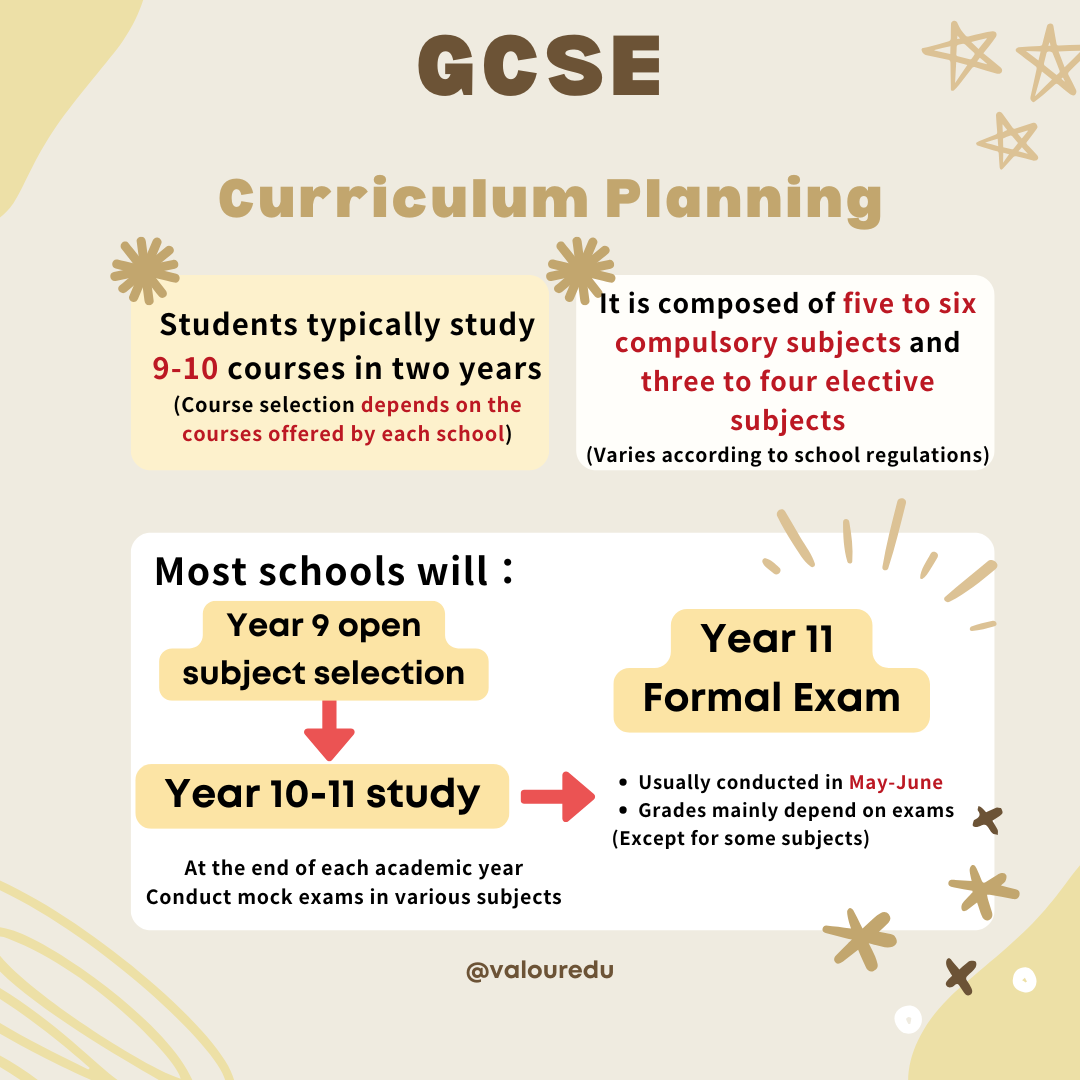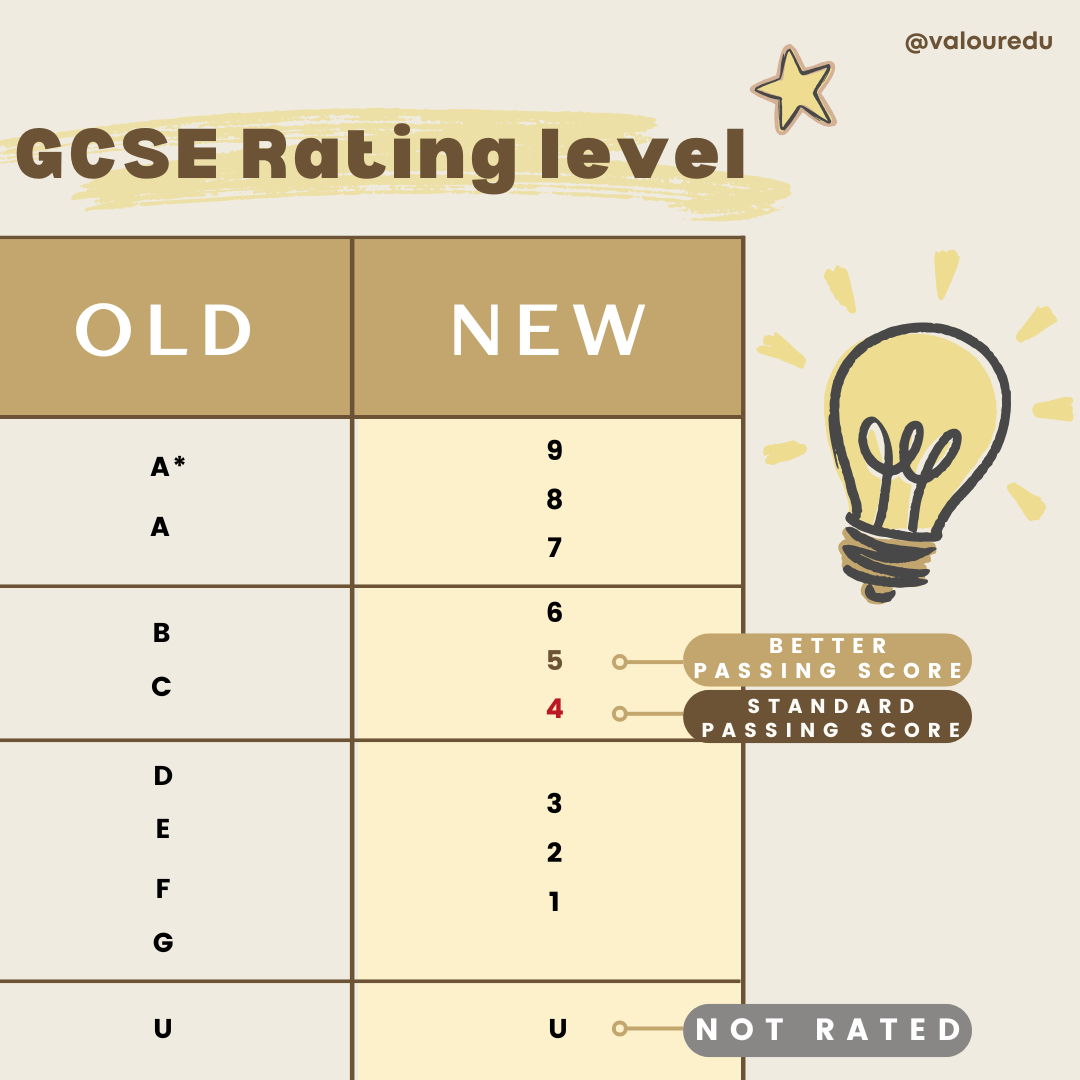A Guide to the UK’s GCSE System: Courses and Planning Tips
1. Introduction to GCSE®
The General Certificate of Secondary Education (GCSE) is the academic qualification awarded to students in the UK at the end of compulsory secondary education, typically during Years 10 and 11. Most students take 9 to 10 subjects over a two-year period. The GCSE program helps students explore their interests and strengths, and their results often serve as the basis for further academic pathways, such as A Levels, the International Baccalaureate (IB), or even university admissions.
2. GCSE® Course Planning
Students typically study 9 to 10 subjects over the two-year GCSE program, consisting of five to six core (compulsory) subjects and three to four electives. The specific subject offerings and requirements vary by school. Most schools begin the subject selection process in Year 9, with students taking their GCSE courses during Years 10 and 11. Mock exams are usually administered at the end of each academic year, while official examinations are held between May and June of Year 11. Final GCSE grades are primarily based on performance in these external exams, with some exceptions depending on the subject.

1.ENGLISH:
- Reading focuses on comprehension skills, requiring students to understand various types of texts—such as leaflets, articles, blogs, and web pages—and identify factual information, abstract ideas, and arguments. It involves locating relevant information from extensive texts and interpreting implied meanings that are not explicitly stated, such as the main idea, purpose, and author’s intent.
- Writing, students learn to produce texts in a range of forms and styles, such as summaries, informal emails, articles, reports, and reviews. The course also emphasizes the understanding and application of grammar, vocabulary, and punctuation.
- Listening involves identifying key information and viewpoints across a variety of contexts, such as phone messages, announcements, conversations, informal discussions, interviews, and formal speeches.。
- Speaking covers a wide range of conversational topics and requires the use of various language structures, along with clear control of pronunciation and intonation.
English Literature focuses on the study and understanding of British prose, poetry, and drama. Students are expected to engage in extensive reading—including essays, short stories, novels, and poems—covering literary works from a range of historical periods in depth.
2.MATH
Mathematics is divided into two tiers: Foundation and Higher.
The curriculum covers six main areas: Arithmetic, Algebra, Ratio, Proportion and Rates of Change, Geometry and Measures, Probability, and Statistics.
3.SCIENCE:
Course Categories
- Core:
Core Science integrates foundational principles of biology, chemistry, and physics into one subject. - Double:
Covers Biology, Chemistry, and Physics with a combined assessment; content is less detailed than Triple Science. - Triple:
Biology, Chemistry, and Physics are studied as three separate subjects, each assessed and graded independently.
Course Content
- Biology: Cell structure / Organisation / Infection and response / Bioenergetics / Inheritance, variation and evolution / Ecology
- Chemical: Atomic structure and the periodic table / Bonding, structure and the properties of matter / Chemical analysis / Quantitative, organic and atmospheric chemistry / Chemical reactions & rates of chemical change / Good lab practice
- Physics: Energy and electricity / The particle model of matter / Atomic structure / Forces and waves / Space and light / Magnetism and electromagnetism
Further Education Advice
- If you plan to apply for professional courses such as Veterinary Science, Medicine, Dentistry, or Engineering, it is recommended to take at least Double or Triple Science at the GCSE level.
- Many universities and future job opportunities require students to achieve at least a Level 4 grade in Mathematics and English

3. Question Types and Assessment Methods
The main assessment methods include written exams and coursework.(depending on the subject)
1. Scoring Method: Exams
Basically, assessments consist of three types, with each subject combining them differently according to its curriculum. For example:
- MCQ
- SAQ
- Essay Question
The new GCSE grading system uses a scale from 9 to 1, with 9 being the highest and 1 the lowest. A grade 4 is considered a standard pass, while grade 5 represents a strong pass. Compared to the previous system, the revised GCSE grading provides more accurate standards and better distinguishes students’ abilities.
Students must achieve at least a grade 4 in five subjects to meet the minimum entry requirements for A-Level studies in the UK.
Note: Some IGCSEs still use the A to F grading scale (Source: BBC).
2. Coursework:
The format of coursework varies depending on the subject and is designed to give students more opportunities to demonstrate creativity and develop practical skills. Common types of coursework include:
| English Literature | Prose, poetry, and essay writing |
| Science (Physics, Chemistry, Biology) | Laboratory reports |
| Drama | Performance |
| Physical Education | Physical Skills |
| Music | Composition |
| Art and Design | Art Portfolio |
For example, in English Literature, students typically work on these assignments under the teacher’s guidance, allowing them to explore the topics in a less time-pressured environment and develop their own essays. Throughout the process, teachers provide support by helping students refine and polish their work.
4.Timeline
GCSE and IGCSE courses typically span two years. At the end of each academic year, students take mock examinations to prepare for the final GCSE exams. The GCSE examinations are comparable to Taiwan’s senior high school entrance exams following junior high school.
- Course selection for Year 9 students is typically open until January or February each year.
-
Mock exams for Year 10 students are usually held towards the end of the year.
- Mock exams for Year 11 students are usually held in October, November, or January. Some schools require students to take two sets of mock exams during Year 11.
- The official GCSE exams take place in May or June of Year 11.
5. Progression from GCSE/iGCSE to Future Studies
In most schools, your choice of A-level or IB® DP subjects will depend on the GCSE elective subjects you have taken and the level of the three science courses completed.
1. Senior High School Admission
GCSE results are the primary criteria for progression to senior secondary education. Some schools require students to have taken specific GCSE subjects in order to enroll in related A-Level or IB® DP courses.
For example, students must have completed GCSE French to be eligible to study A-Level French.
2. Applying to University
GCSE results have a significant impact on university admissions. Some universities set specific GCSE subject requirements or minimum grade thresholds for entry. These requirements can vary by institution and academic program.
For example:
- University College London (UCL) requires GCSE English and Mathematics with a minimum grade of 5.
- Imperial College London (ICL) requires GCSE Mathematics and Science with a minimum grade of 7.
- Cambridge and Oxford universities handle admissions on a case-by-case basis and do not have specific requirements regarding the number of GCSE subjects taken. They emphasize quality over quantity.
- UK medical schools typically require applicants to submit their top eight GCSE grades.
- The University of Toronto in Canada requires applicants to have completed at least five GCSE subjects.
Note: The above entry requirements are based on 2023 admissions and are for reference only. Actual requirements are subject to official announcements by each institution.
3. Preparing for Employment
GCSE results hold significant importance in the UK job market and are an essential part of a recent graduate’s CV.
For example, some positions require minimum GCSE grades in English and Mathematics.
6.Q&A
Q: How should students plan their GCSE subject choices?
A: When choosing GCSE subjects, Valour recommends focusing on three key directions:
-
Understand your goals and aspirations. Ensure course diversity to keep future academic options open. If your career path is clear, select subjects related to your intended field.
-
Prioritize quality over quantity by maintaining a balance of 9 to 10 subjects, and be aware of your strengths and weaknesses.
-
Seek timely advice from experienced and familiar individuals, such as senior students, teachers, or education consultants.
By following these three principles, you can make your GCSE subject choices more effective and less stressful.
Q: What is the difference between GCSE and IGCSE?
A: The main difference between GCSE and IGCSE is that GCSE is designed primarily for students aged 14 to 16 studying in the UK, whereas IGCSE is tailored for international students of the same age group. GCSE courses are mainly offered in secondary schools within the UK, Canada, Australia, India, and a few other countries. In contrast, IGCSE is internationally recognised and available in over 150 countries worldwide.
Additionally, the GCSE curriculum is focused on British students, featuring mandatory components such as Shakespeare in English Literature, and history and geography topics centred on British Commonwealth countries. The IGCSE curriculum, however, is designed with a global perspective; for example, Shakespeare is not a compulsory part of English Literature, and the humanities subjects cover broader, more international themes.



